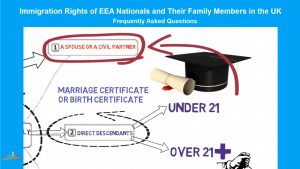Any EEA national, residing in the UK can invite two types of family members to join him: direct and extended.
Direct Family Members of European Economic Area Nationals in the UK: In today’s video I’ll explain the rules about direct family members of EEA nationals. Watch my next videos if you want to find out more about extended family members.
However, before I do that I would like to explain why it is important to understand the distinction between direct and extended family members.
Extended family members can ONLY be treated as family members for UK Immigration purposes if they have been issued with certain residence documents. These documents include but are not limited to an EEA family permit, a registration certificate or a residence card and continue meeting the relevant conditions. Extended family members will not be eligible to make their permanent residence application without such a document. So, the rights of extended family members are NOT automatic. They have to be proven by getting one of these documents.
Whereas it is all relatively straightforward for direct family members. They do not need to prove anything as long as they provide documents confirming their relationship with their EEA national relative. And if relevant, they also have to show their financial dependency.
There are 3 categories of people who will be direct family members for UK immigration law purposes:
1. a spouse or a civil partner;
2. direct descendants (children, grandchildren, greatgrandchildren) of the EEA national or their spouse or civil partner who are either:
a. under the age of 21;
b. or, if they are over the age of 21. They can still be direct family members of the EEA national or their spouse or civil partner if they prove their financial dependency on them; and finally
3. dependent direct relatives in the ascending line. These can be parents, grandparents, great-grandparents of the EEA national or their spouse or civil partner.
Where the EEA national sponsor is a student and has resided in the UK for more than 3 months, a family member will only have a right to reside if they are either:
a. the dependent child of the EEA national or the EEA national’s spouse or civil partner;
b. a qualified person in their own right;
The situation with spouses and children under the age of 21 is clear. All they have to do is to show a document (either their marriage certificate or their birth certificate) confirming their relationship.
With other categories (children over the age of 21 and relatives in the ascending line) – dependency is the key element to prove.
The question is how do they prove this dependency?
According to the Home Office Guide, you can prove your dependency by providing bank or building society statements or evidence of money transfers. Also, these can be evidence of living in the same household (if applicable). Additionally, the UKVI will accept other evidence to show their EEA national sponsor has enough money to support them; and that this relative is reliant on them for this.
There is one more important point, which I wanted to make here. You do NOT need to be dependent on the EEA national to meet ALL or MOST of your essential needs. You are still ‘dependent’ for immigration law purposes if you receive a pension. This is if it covers half of your essential needs. Also if money from the EEA national to cover the other half.
Also, you do not need to show why you need the EEA national’s financial support. It is irrelevant if you can support yourself by working but choose not to do so. This is if the relevant EEA national does actually support you.

